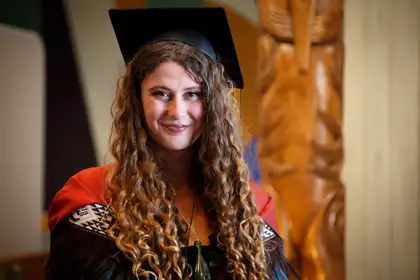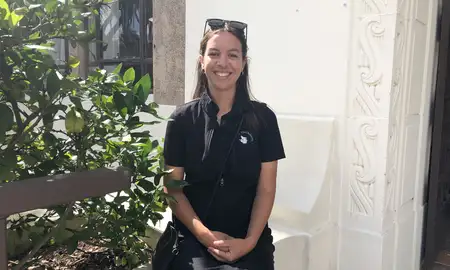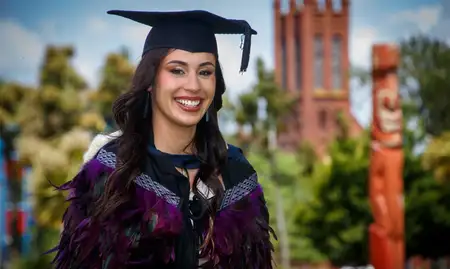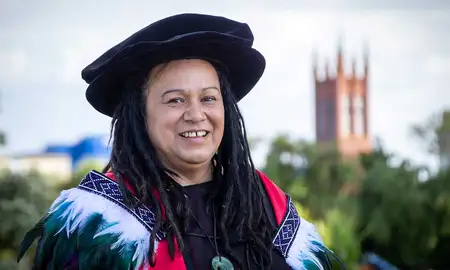
Talia Brewer on her graduation day in Wellington in April.
After taking a pause in her academic journey, Talia found herself inspired to return to study after talking to a friend who is a social worker. She says the course changed the direction of her life.
“I loved the idea of empowering people and breaking down barriers so they can seek more opportunities. I loved the course and the Māori Development paper I took. It awoke such a passion in me for te ao Māori, which led me to do placements with Māori organisations as well as basing a lot of my assignments and research around kaupapa Māori social work.”
Growing up, Talia says she shied away from embracing her Māori identity due to the negative responses and scepticism she received. She found that her time at Te Kunenga ki Pūrehuroa Massey University allowed her to learn about herself, her culture and how she fit into it.
“It was comforting to realise there were other people who felt the same way as me, who had experienced whakama, that cultural embarrassment, because I didn’t grow up with te ao Māori and I look quite Pākehā. But my time at Massey showed me how amazing te ao Māori is and I’m so proud to be Māori. It’s an incredible culture and if you’re not interested, you’re missing out.”
It was during Talia’s first placement at the New Zealand Prostitutes Collective (NZPC) that she began to sharpen her focus on where to take her research and her career.
Talia’s placement spanned six months, where three days a week she would work with sex workers to provide them support. This included providing information on how to be safe in the industry for newcomers, attending different tertiary education institutions to educate on and destigmatise sex work and accompanying sex workers during situations with police involvement to advocate on their behalf.
“I have a background in sex work myself so I really loved being able to chat with sex workers about what they’re going through and how we can help them,” Talia says.
The research Talia undertook for her master’s looked at how social services can create and offer more culturally sensitive engagement with Māori sex workers. As a result, she created a Māori model of practice which Talia says can be used by social services to provide sex workers with better support.
“I loved creating the Māori model of practice because it was my two passions coming together – te ao Māori and sex worker rights. The placements I experienced were all amazing and offered me such incredible opportunities. I also worked with Kahungunu Whānau Services which was interesting.”
Talia is now continuing this line of research with NZPC and has become their Deputy Chair.
“I’m currently in the process of interviewing Māori sex workers as we’re looking at gaining a Māori perspective of the industry. This research is a first of its kind, especially as it’s research about Māori sex workers who are being interviewed by Māori sex workers. It’s important because not only will it help Māori sex workers to have tino rangatiratanga (autonomy) over their own bodies, but it’ll be beneficial for indigenous studies around the world and could help other sex workers of different cultures.”
Alongside this research, Talia is continuing to attend universities and conventions to share education and advocate for sex workers. She is also a pole dancing instructor on the side and is about to undertake a new course which she says will help elevate her social work career.
“Another door that has opened from doing my master’s is that I’m now enrolled in Heke Rongoā Diploma in Māori Holistic Wellbeing, which looks at using your natural surroundings to benefit others and yourself. I really want to involve Rongoā (traditional healing system of Māori) into my social work career and incorporate alternate ways of healing for Māori so they don’t necessarily have to fit into a Pākehā model.”
Talia says she’s been blessed with the people and aroha she’s had around her during her journey.
“I’d like to thank my mum Lara, my best friend and flatmate Zac and Lydia who I studied with heaps during my master’s. I’d also like to thank everyone at NZPC especially Tanya, Cherida and Chanel. From Kahungunu Whānau Services, I’d like to thank Renata, Kai, Elena and all the beautiful whaea that supported me and continue to support me now. I’d like to thank my two incredible external supervisors Hanny and Melissa. Finally, I’d like to thank Dr Paulè Ruwhiu who was the course coordinator for the amazing Māori Development paper that changed everything.”
Related news
A passion for people is the key to success for social work student
Jade de Figueiredo wants to be able to help others navigate their journey in life so is studying towards a Bachelor of Social Work.

Upholding the mana of te reo: Graduate completes entire degree in Māori
For most people, completing their first degree is hard enough as it is, but Suraya Goss, Te Ātihaunui-a-Pāpārangi, took on the added challenge of completing her entire qualification in te reo Māori.

Call for social work to be 'decolonised'
A Massey University researcher is calling for social work education in Aotearoa New Zealand to be decolonised. Social work lecturer Dr Paulè Ruwhiu, Ngā Ngāti Porou, has just completed her PhD research into the process of decolonisation and the experiences of Māori social workers and Māori social work students.
